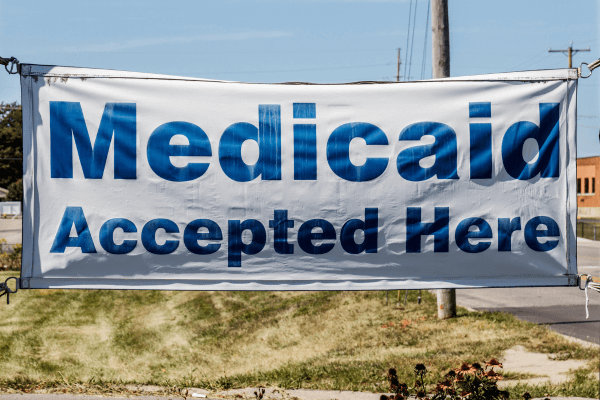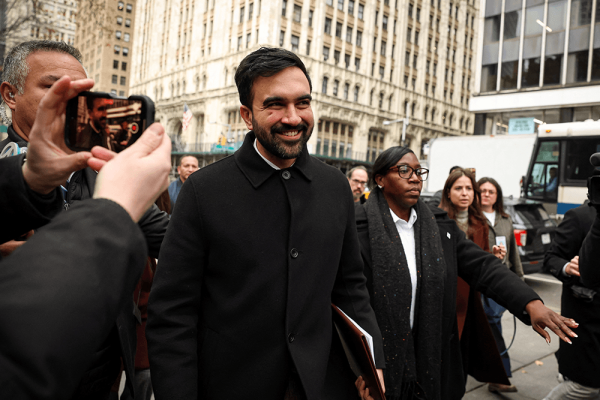When I teach people how to advocate on Capitol Hill, I say that the best way to appeal to legislators is to build a common vision for humanity rooted in shared values. Early in my political advocacy career, I assumed that as a Christian, I’d have an easier time of this since more than 87 percent of Congress claims to share my Christian faith.
For me, this faith has always been rooted in Jesus’ lived example of how we are to be unapologetic in our support for each other. And when Jesus says, “love thy neighbor as thyself,” I imagined this meant, well, help thy neighbor, assist thy neighbor, care for thy neighbor, nurture thy neighbor — all without condition or justification, just as Jesus did.
But since then, I’ve learned a serious lesson about the limitations of the Christian imagination in politics. Despite the faith we share, many lawmakers in this country don’t seem to envision a country where we actually put these values into practice. My latest disappointment? Millions of people losing Medicaid coverage — our nation’s primary public health system that provides health care and support for folks with low income and/or disabilities — because states refuse to do the right thing.
At the start of the COVID-19 pandemic, Congress put into place protections for people enrolled in Medicaid to ensure that they were able to stay covered while the country was under a public health emergency. This policy, known as “the continuous coverage requirement,” allowed states to receive additional federal money for their Medicaid programs in exchange for not kicking people out of the program for as long as the country remained under a federal public health emergency.
From a Christian perspective, I saw this policy as an astounding move of faith and care by the federal and state governments to ensure the safety, protection, and health of our society’s most under-served people at a moment when they needed it the most. Serving more than 90 million people, Medicaid is an enormous investment in the people in the U.S. — the kind of good work that Jesus would be proud of. As Christians, we should be applauding the fact that our country has such a system in place: It is a testament to the value we place on humanity because we are made in the image of God and therefore treat each other in a manner befitting of the Spirit.
As it happens, providing health care coverage to as many people as possible amid a highly contagious, airborne, and deadly pandemic is also just common sense, even through a purely capitalist lens: Healthy people translate to a thriving labor force and a thriving economy, an idea supported by decades of research from organizations like the Blue Cross Blue Shield, the American Medical Association, and Harvard’s T.H. Chan School of Public Health. Put differently, preventing people from getting seriously ill, permanently disabled, and/or unable to work at their full capacity is vital to our economic wellbeing and national security survival.
Unfortunately, it seems that some states have neither Christian goodness nor capitalist common sense.
Last year, Congress severed the link that made additional Medicare funding dependent on keeping people enrolled and set March 31, 2023 as the end of the continuous coverage requirement, regardless of whether the COVID-19 health emergency was in effect. States were tasked with “unwinding” the continuous coverage requirement by reviewing the eligibility of every person enrolled in Medicaid in their state and either renewing or removing them from the program. Given that Medicaid enrollment grew enormously during the pandemic, increasing over 30 percent from 64 million in January 2020 to 85 million by late 2022 , one would think state Medicaid agencies would begin preparing for the bureaucratic nightmare of making coverage determinations for millions of people. One would also think that state Medicaid agencies would have begun creating a process to ensure millions of people did not erroneously lose coverage, acting with integrity and morality because they are dealing with human lives.
One would be wrong.
Eight states could not wait to kick people off their Medicaid rolls and began the process in February, before continuous coverage officially ended. According to data from KFF, a health policy information organization, a total of more than 5.6 million people have already lost health care coverage through Medicaid, an astounding figure that far surpasses the number of people who normally lose coverage annually. In many states, well over a quarter of Medicaid enrollees have been terminated or determined ineligible; in Texas, that number is more than 60 percent. In Florida, which has disenrolled more than 30 percent of Medicaid enrollees, families are suing the state, saying that they were removed without due process.
The Department of Health and Human Services has predicted that as many as 15 million people will ultimately lose coverage. The department estimates that more than 60 percent of those who lose coverage will be be Black, Latine, Asian American, Pacific Islander, or a multiracial identity, further exacerbating our already poor health care outcomes and treatment.
According to KFF estimates, as many as 73 percent of those disenrolled are being removed through a process called “procedural terminations,” which is when states mail out Medicaid renewal forms, never hear back, and thus remove someone. This is a problematic process because once someone is removed, they must go through extra bureaucratic hurdles to try to get back on Medicaid — an application process that’s already plenty difficult. For example, some states may mail the renewal packet to the wrong address or to a person who is unhoused and, therefore, does not have a stable mailing address, or to a family in a rural area with limited mail access. Even assuming the recipient receives the forms, they are overwhelming, require massive amounts of information, and can be written in such technical jargon that nothing makes sense. As someone who has applied for Medicaid for myself and helped patients through the process as a social worker, I can tell you: The hoops this country makes the most deserving jump through to get the things they need is appalling and shameful, with state Medicaid agencies largely to blame.
Medicaid is administered and run by each state, with the federal government providing oversight and additional funding. This means that each state has enormous power and flexibility to determine who to cover, what services and treatments to provide, how to deliver care, and how much to reimburse providers. What is crucial here is the states’ ability to decide who to cover, something that gives state health officials extraordinary power to determine who is “deserving” or “poor” enough to be eligible to receive Medicaid. Although the Centers for Medicare & Medicaid Services is responsible for Medicaid program administration at the federal level, individual state Medicaid agencies establish many policies and manage their own programs on a day-to-day basis. This is due to federal law, which requires each state to designate a single state agency to administer and/or supervise the administration of its Medicaid program. This structure gives state politicians the power to decide who is “entitled” to receive it based on ineligibility requirements, creating space for states to decide that people aren’t “poor enough” or “sick enough” or “deserving enough” based on their own understanding of human needs.
When I look at the value judgements behind these decisions, I see states trying to decide: Whose suffering matters? Who is worthy of help and support? I can’t pretend to understand these values. My own faith teaches me that everyone is worthy of love, care, and concern, with extra special attention to help those who are most vulnerable. My faith allows me to imagine a nation where, if anyone lacks clothes or food, we give them the things they need just like it says in James 2:15-16. And my faith empowers me to make this vision a reality, on earth as it is in heaven, knowing that when one person suffers, we all suffer, and when one rejoices, we all share in the joy (1 Corinthians 12:26); I wish Christian lawmakers felt the same way.
Got something to say about what you're reading? We value your feedback!






